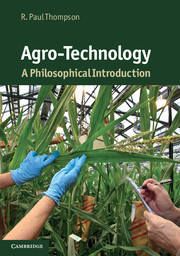Book contents
- Frontmatter
- Contents
- List of figures
- List of tables
- Preface
- Introduction
- 1 Scientific background
- 2 Application of genetics to agriculture
- 3 Philosophical and conceptual background
- 4 The controversy
- 5 The controversy
- 6 The controversy
- 7 The organic alternative
- 8 Impacts on low- and middle-income countries
- Concluding remarks
- Bibliography
- Index
4 - The controversy
Ideological and theological objections
Published online by Cambridge University Press: 05 June 2012
- Frontmatter
- Contents
- List of figures
- List of tables
- Preface
- Introduction
- 1 Scientific background
- 2 Application of genetics to agriculture
- 3 Philosophical and conceptual background
- 4 The controversy
- 5 The controversy
- 6 The controversy
- 7 The organic alternative
- 8 Impacts on low- and middle-income countries
- Concluding remarks
- Bibliography
- Index
Summary
The controversy over agricultural biotechnology has two faces. One face, the one addressed in this chapter, has to do with philosophical, theological or, more broadly, ideological commitments. These include concerns about humans ‘creating’ new forms of life, about violating or transgressing some fundamental ethical or theological principles, about an economic system in which commodities essential for health – indeed survival – such as food, water and therapeutics are controlled by private enterprises – through patents, concentration of the means of distribution and the like – and the transformation of human existence. The other face, addressed in the next two chapters, has to do with presumed benefits and harms, and balancing them. There are benefit and harm issues embedded in the philosophical, theological (Brunk and Coward, 2009) and ideological concerns, but those typically are not the focus, motivation or underpinnings of the concerns or their resolution.
Much of the controversy explored in this chapter arises from the views of advocacy groups and non-governmental organisations (NGOs): religious denominations, aid organisations, lobby groups and the like. Understanding some facets of these groups is an essential part of coming to terms with their positions, tactics and motivations. Hence, I begin this chapter by glancing into the world of advocacy groups.
- Type
- Chapter
- Information
- Agro-TechnologyA Philosophical Introduction, pp. 101 - 136Publisher: Cambridge University PressPrint publication year: 2011

